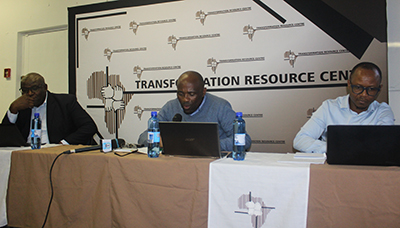By Liapeng Raliengoane
MASERU – A panel discussion on the Lesotho General Certificate of Secondary Education (LGCSE) results in the Face of Curriculum reforms and Low Government Budget Allocation held last week suggested implementing the Intermediary Colleges as way forward in addressing challenges facing LGCSE.
This transpired at an event held by the Transformation Resource Centre (TRC) in collaboration three Researchers from the National University of Lesotho (NUL) namely Associate Professor Mohaeka Raselimo from the faculty of Education, Professor Mosotho George Mosotho from the faculty of Science and technology and Dr. Ramaele Moshoeshoe from the faculty of Social Sciences.
The National Curriculum Development Centre in collaboration with Examinations Council of Lesotho define LGCSE Design and Technology syllabus as a syllabus that enables learners to identify, consider and solve problems through creative thinking, planning and design and by working with different media, materials and tools and understand how these skills can be used. The syllabus is structured so that candidates attain both practical skills and theoretical knowledge.
TRC Research and Information Officer Thuso Mosabala disclosed that following the issues raised concerning LGCSE results on the news program on the People’s Choice FM that TRC plays part in its production, they found it worthy to engage researchers on the issue further.
NUL faculty of Education Associate Professor Mohaeka Raselimo said they are not evaluating or blaming anyone but are discussing these issues about the broader system of education in the country which are broader than just the secondary education sector.
He listed some opinions about poor performance in LGCSE Examinations as the following: Covid-19 disruptions, Learner-related factors, an example being low cognitive abilities, low intrinsic motivation and lack of home-based support, Low teacher morale leading to prolonged strikes and turnover. Last but not least, some blame the ministry of Education and Training for failing to provide sufficient teacher in-service training to support implementation of the “noisy” integrated curriculum.
On the statistical analysis of 2022 LGCSE results, data shows that over the past five years by symbols attained, there is a declining performance from 2018 to 2022. Sharp decline from 202 to 2022. Line graph for 2022 depicts more % of G and U symbols, going back to 2018, 2022 performance is the worst.
Professor Raselimo said these percentages of passes are low with top performing district having 52.9% pass symbols. There is wastage as a high percentage of candidates across the ten districts are not admissible in tertiary institutions.
The possible contributing factors mentioned were: Technical issues, lack of teaching or learning resources, large class sizes, inadequate Continuing Professional Development (CPD) activities for teachers, low teacher quality and poor school leadership. On the Structural or systemic factors: flaws in LGCSE reforms, lack of content progression between grade levels in the LGCSE programme and mismatch between the democratic visions of the integrated curriculum and local contexts.
NUL Dean of the faculty of Science and Technology Professor George Mosotho expressed that the National Strategic Development Plan (NSDP 2) and its extended version mentions Technology and innovation as core areas in development. He said looking at 2022 LGCSE results 286 candidates got a B grade and 79 got A and A* grades, this means these are the only qualifying candidates to study mathematics at any tertiary institution. He indicated that the Science Technology Engineering and Mathematics (STEM) subjects need a B grade.
As a solution, Professor Mosotho urges for Intermediary Colleges to be implemented so that after completing LGCSE, candidates can go sharpen skills in those schools before going to a tertiary institution.
From the Faculty of Social Sciences Dr. Ramaele Moshoeshoe who is an Economist with interest in the intersection of development economics, labour economics and education economics pointed out that the 2018 MELGO data from the assessment done: children in Lesotho underperform in language literacy and numeracy, children are not prepared to enter primary schools and once foundation is missed there will be much problems in future. 8% could identify 1.8 letters out of 60 letters. He stressed the importance of foundational skills in preparing children for higher education.
The discussion reached an agreement on the following as way forward: further research on contributing factors, review of the entire basic education system and pre-service teacher training programmes to identify gaps and real issues and capacity strengthening of the education inspection unit.


